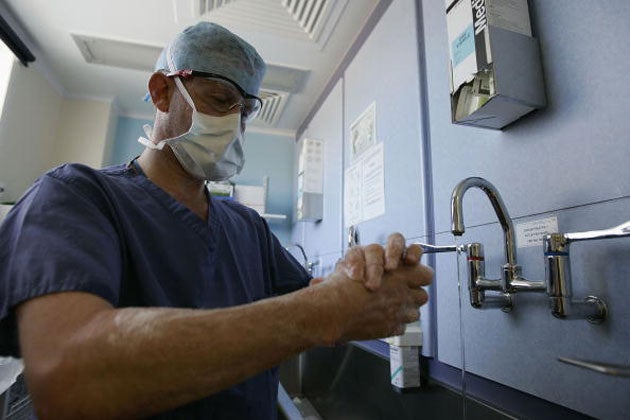Bad doctors are overwhelmingly men
Women much less likely to be suspended over poor work, study finds

Women make safer doctors than men, according to the UK's largest study of medical performance.
They are less likely to be investigated over concerns about their behaviour, clinical skills or conduct and are significantly less likely to be suspended or excluded from work than their male colleagues.
An analysis of almost 5,000 doctors and dentists referred to the National Clinical Assessment Service (NCAS) over the past eight years because of worries about their performance shows a strong gender imbalance. Around 800 doctors and 100 dentists are referred each year.
The study found that psychiatrists, obstetricians and GPs were most likely to arouse concern about their performance. The NCAS was set up in 2001 following a series of high-profile scandals in the 1990s. One of the most notorious involved Rodney Ledward, a hospital consultant who styled himself the "fastest gynaecologist in the west" and was struck off the medical register in 1998 after a series of botched operations. Ledward, who died in 2000, was later the subject of a public inquiry which reported that he injured scores of women.
To protect patients from doctors like Ledward, the NCAS provides advice and support to doctors in difficulty, formal assessment where the problem is more serious, and suspension and exclusion in the most severe cases.
A report published yesterday shows that 873 women were referred to the service over the eight-year period, compared with 3,635 men. Women comprised only 20 per cent of the referrals but make up 40 per cent of the workforce.
In the most serious cases, 50 women hospital doctors were excluded from work, compared with 290 men. Among GPs, 29 women were excluded compared with 200 men.
Rosemary Field, deputy director of the NCAS, said: "It is not that women are better doctors than men. But there is research showing that they tend to have longer consultations and are more patient-centred than men. Other studies show they are less likely to be risk takers."
Two referrals in three concerned clinical skills but half also raised concerns about behaviour. One in four referrals was for health reasons, including depression and addiction to drink or drugs.
Peter Old, chief author of the report, said that psychiatrists worked in teams, attended mental health tribunals and could be "subject to more scrutiny" than their colleagues, which might account for the high referral rate.
Black and Asian doctors who qualified overseas were also more likely to be referred to the NCAS than white UK-trained colleagues. But black doctors who qualified in the UK were not more likely to be referred, suggesting there was not wide discrimination on grounds of race. NCAS said that it would keep this under close review, adding: "The service should examine how practitioners who qualified outside the UK should be supported."
At the end of 2007-8, a total of 122 doctors were suspended or excluded, including seven hospital specialists and 15 GPs suspended for more than two years, most on charges of misconduct. Where a doctor is suspended on full pay, costs of replacing them and meeting legal and adminsitrative charges can amount to £500,000, Dr Old said.
The figures show that the average length of exclusions for hospital specialists shortened between 2006-7 to 30 weeks, but it lengthened for GPs to 55 weeks.
"NHS trusts are working to get the time down but their hands may be tied while they wait for something to happen either at the General Medical Council or the police," Dr Old said.
3,635
Complaints about male doctors in eight years, with 873 about women.
Join our commenting forum
Join thought-provoking conversations, follow other Independent readers and see their replies
Comments
Bookmark popover
Removed from bookmarks